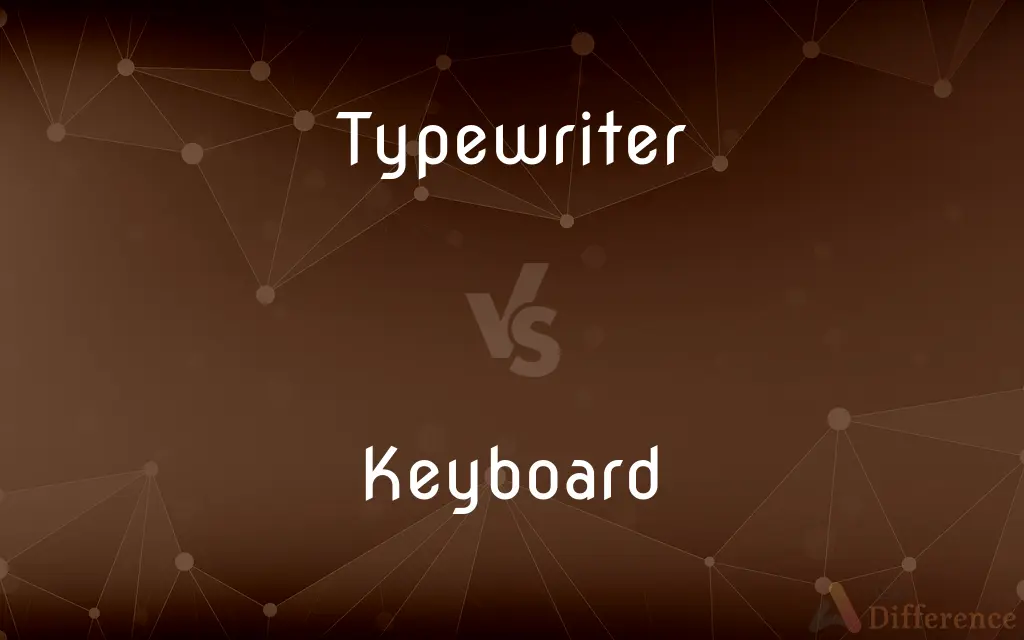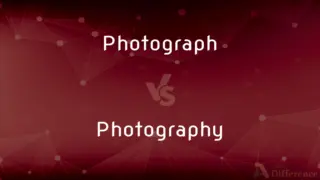Typewriter vs. Keyboard — What's the Difference?
By Urooj Arif & Fiza Rafique — Updated on March 27, 2024
A typewriter is a mechanical device for typing characters onto paper, while a keyboard is an electronic input device for computers and digital systems.

Difference Between Typewriter and Keyboard
Table of Contents
ADVERTISEMENT
Key Differences
Typewriters mechanically imprint characters onto paper through the physical force of pressing keys, creating a direct physical connection between the action and the result. On the other hand, keyboards send electronic signals to a computer or device, translating keystrokes into digital characters displayed on a screen. This difference fundamentally changes the user's interaction with text, offering immediate editing and formatting capabilities with keyboards that typewriters lack.
The tactile feedback from typewriters is distinct, with each key producing a noticeable physical response and sound, contributing to a unique typing experience. Whereas, keyboards vary widely in their tactile feedback, from the clicky keys of mechanical keyboards to the soft touch of membrane keyboards, providing options for personal preference but often lacking the singular mechanical feedback of typewriters.
Typewriters require no electricity and offer a standalone operation, making them portable in a different sense than electronic devices. In contrast, keyboards need an electronic device like a computer to function, limiting their usability to contexts where such technology is available.
With typewriters, corrections are cumbersome, often requiring physical correction tape or fluid, which can interrupt the writing process. Keyboards, however, facilitate easy corrections and revisions, thanks to software features like backspace, delete, and cut-and-paste functions, enhancing the efficiency of writing and editing.
The permanence of typewritten documents stands out; once a letter is typed, it’s permanently marked on the paper, barring physical alterations. Keyboards enable dynamic document creation, where changes can be made seamlessly without leaving a physical trace, offering greater flexibility but also less tangibility in the initial drafting phase.
ADVERTISEMENT
Comparison Chart
Medium
Physical paper
Digital screens
Operation
Mechanical
Electronic
Tactile Feedback
Direct, with a uniform response
Varies, from clicky to soft-touch
Power Requirement
None
Requires electricity
Portability
Physically portable, standalone use
Portable, but requires a computer or device
Correction Capability
Cumbersome, manual
Easy, with digital editing tools
Document Permanence
Immediate and permanent
Editable, with changes not immediately visible
Typing Experience
Unique, with mechanical feedback
Customizable, less uniform
Reliance on External Devices
None
Dependent on computer or digital device
Editing and Formatting
Limited, manual processes
Extensive, with software support
Compare with Definitions
Typewriter
Employs a ribbon and key levers for operation.
The typewriter's ribbon needed replacement after finishing the manuscript.
Keyboard
Can be mechanical, membrane, or virtual.
He preferred a mechanical keyboard for gaming due to its precise feedback.
Typewriter
Offers a standalone writing experience.
Without electricity, he preferred using his typewriter for drafting letters.
Keyboard
Enables easy editing and formatting.
With a few keystrokes, he reformatted the entire document.
Typewriter
Requires manual correction methods.
She used correction fluid to fix typos made on her typewriter.
Keyboard
Allows for a customizable typing experience.
He adjusted the keyboard settings to speed up his workflow.
Typewriter
Provides tangible, immediate results.
The freshly typed document lay on the typewriter's platen, ready for mailing.
Keyboard
A row of levers that are depressed with the fingers to produce or modulate the sound of an instrument, such as a piano or organ.
Typewriter
(Printing) A typestyle like that of typewritten copy.
Keyboard
Requires an electronic device to function.
She bought a wireless keyboard for her tablet to make typing easier.
Typewriter
A mechanical device for writing characters on paper.
She typed the invitation letters on an old typewriter, enjoying the tactile feedback.
Keyboard
An electronic device for inputting characters into a digital system.
She connected the keyboard to her laptop to write her novel.
Typewriter
A typewriter is a mechanical or electromechanical machine for typing characters. Typically, a typewriter has an array of keys, and each one causes a different single character to be produced on paper by striking an inked ribbon selectively against the paper with a type element.
Keyboard
A panel of buttons used for typing and performing other functions on a computer or typewriter.
Typewriter
A writing machine that produces characters similar to typeset print by means of a manually operated keyboard that actuates a set of raised types, which strike the paper through an inked ribbon.
Keyboard
Any of various instruments, played by means of a musical keyboard, often connected to a synthesizer or amplifier.
Typewriter
A device, at least partially mechanical, used to print text by pressing keys that cause type to be impressed through an inked ribbon onto paper.
Keyboard
To set (copy) by means of a keyed typesetting machine
Keyboard a manuscript.
Typewriter
(archaic) One who uses a typewriter; a typist.
Keyboard
To enter (text or data) into a computer by means of a keyboard.
Typewriter
A machine gun or submachine gun (from the noise it makes when firing).
Keyboard
(Music) To play (a composition) on a piano or keyboard.
Typewriter
A prank in which fingers are jabbed roughly onto someone's chest followed by striking them over the ear in imitation of using an old-fashioned typewriter.
Keyboard
A set of keys used to operate a typewriter, computer etc.
Typewriter
An instrument for writing by means of type, a typewheel, or the like, in which the operator makes use of a sort of keyboard, in order to obtain printed impressions of the characters upon paper.
Keyboard
(music) A component of many instruments including the piano, organ, and harpsichord consisting of usually black and white keys that cause different tones to be produced when struck.
Typewriter
One who uses such an instrument.
Keyboard
(music) A device with keys of a musical keyboard, used to control electronic sound-producing devices which may be built into or separate from the keyboard device.
Typewriter
Hand-operated character printer for printing written messages one character at a time
Keyboard
(intransitive) To type on a computer keyboard.
Keyboarding is the part of this job I hate the most.
Keyboard
The whole arrangement, or one range, of the keys{3} of an organ, piano, typewriter, etc.; that part of a device containing the keys{3} used to operate it.
Keyboard
Device consisting of a set of keys on a piano or organ or typewriter or typesetting machine or computer or the like
Keyboard
Holder consisting of an arrangement of hooks on which keys or locks can be hung
Common Curiosities
Can you use a typewriter without electricity?
Yes, typewriters are mechanical and do not require electricity.
Are typewriters still used today?
While not common, typewriters are still used by some enthusiasts and in specific contexts for their unique features.
Can keyboards work independently without computers?
No, keyboards need to be connected to a computer or digital device to function.
Can you correct mistakes easily on a keyboard?
Yes, keyboards allow for easy corrections using backspace, delete, and other editing functions.
Do typewriters offer different fonts and sizes?
Typewriters have fixed fonts and sizes, determined by the model and the typeface of the installed ribbon.
What’s the advantage of using a keyboard over a typewriter?
Keyboards offer digital convenience, including editing, formatting, and seamless integration with modern technology.
Can you save documents on a typewriter?
No, typewriters produce physical documents; there's no digital file to save.
Are keyboards customizable?
Yes, especially mechanical keyboards, which can be customized in terms of keycaps, switches, and more.
Is it possible to connect a keyboard to a tablet or smartphone?
Yes, many keyboards can connect to tablets and smartphones via Bluetooth or USB.
How do typewriter ribbons work?
Typewriter ribbons transfer ink to paper when keys are pressed, imprinting characters.
Do all keyboards have the same layout?
No, there are various keyboard layouts, such as QWERTY, AZERTY, and Dvorak.
How do you maintain a typewriter?
Maintenance includes cleaning, oiling the mechanics, and replacing the ribbon.
Can typewriters be used for all types of documents?
Yes, but with limitations in formatting and correction compared to digital documents.
Are there wireless typewriters?
No, typewriters are mechanical and do not feature wireless capabilities; however, there are typewriter-inspired wireless keyboards.
How does the tactile feedback of a keyboard compare to a typewriter?
Typewriters provide consistent mechanical feedback, while keyboards’ feedback can vary widely depending on the type.
Share Your Discovery

Previous Comparison
Photograph vs. Photography
Next Comparison
Mandola vs. MandolinAuthor Spotlight
Written by
Urooj ArifUrooj is a skilled content writer at Ask Difference, known for her exceptional ability to simplify complex topics into engaging and informative content. With a passion for research and a flair for clear, concise writing, she consistently delivers articles that resonate with our diverse audience.
Co-written by
Fiza RafiqueFiza Rafique is a skilled content writer at AskDifference.com, where she meticulously refines and enhances written pieces. Drawing from her vast editorial expertise, Fiza ensures clarity, accuracy, and precision in every article. Passionate about language, she continually seeks to elevate the quality of content for readers worldwide.
















































